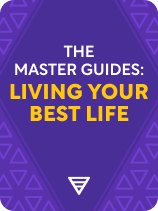

This article is an excerpt from the Shortform book guide to "The Master Guides: Living Your Best Life" by Shortform. Shortform has the world's best summaries and analyses of books you should be reading.
Like this article? Sign up for a free trial here.
Do you feel like you’re getting nowhere in life? How can you make a change that will improve your life forever?
You may know what you want out of life, but it can be hard executing it. Luckily, we have different ways to start living in alignment with your values and make changes to your life.
Below we’ll look at three rules for learning how to make changes to your life.
1) Set Life Rules
Want to know how to make changes to your life? Brianna Wiest (The Mountain Is You) says you must create life rules that will help you live in alignment with your values. These rules should represent personal commitments that you believe in and that will shape your life in the long term. For example, if you have a life rule to cut ties with people who regularly make you feel bad, you’ll live a life surrounded by positive people who encourage you to be your best self.
Life rules will encourage you to continually live in alignment with your values, and help you overcome barriers that may cause you to stray from your intended path. Living by your rules will ensure that you’re happy and always progressing toward the best version of yourself.
Making rules around all your values might be overwhelming, and having too many values may restrict your ability to commit to the things that are most important. Try choosing the two most important values on your list and prioritizing them, as Brené Brown recommends in Dare to Lead.
2) Align Your Goals With Your True Self
One way to commit to living your values is to choose goals that are important to you, and therefore feel more meaningful than the goals other people expect from you. Focus on the following three areas to set appropriate goals.
Focus Area 1: Enjoyable Activities
Neil Pasricha (The Happiness Equation) suggests that one way to choose meaningful goals is to consider what activities you do purely for enjoyment. From there, increase your happiness by brainstorming additional ways to pursue these activities in different contexts or with different people. For example, if you enjoy writing, start a blog or join a writing group to create more opportunities to experience happiness.
Gretchen Rubin (The Happiness Project) builds on Pasricha’s advice: Once you’ve pinpointed your most enjoyable activities, set an ambitious goal that requires you to actively engage in these activities to succeed. Having goals that tie directly to what you feel passionate about will help you prioritize time spent on your interests and create more opportunities for similar uplifting experiences. For example, Rubin’s love of writing inspired her to set the ambitious goal of completing a 50,000-word novel in one month. Her work on this goal led to a number of opportunities that now allow her to pursue her love of writing as a full-time career.
Focus Area 2: Innate Gifts and Talents
Deepak Chopra (The Seven Spiritual Laws of Success) argues that you have innate gifts and talents that you’re meant to contribute to the world. You should choose goals that align with these natural tendencies because they’ll feel more meaningful and enjoyable to pursue. He claims that aligning your strengths and interests in this way creates the perfect environment for success.
Focus Area 3: Who You Want to Be
Jay Shetty (Think Like a Monk) suggests another way to create value-based goals: Set intentions for who you want to be as you move through your day. He explains that focusing on who you want to be rather than on what you want to or have to achieve opens you up to experiencing life in a more satisfying way. For example, there are certain work projects that frustrate you. When you consider who you want to be as you complete them (calm, positive, productive), you switch from being frustrated to being calm and positive. This improves the way you experience your work and your ability to both enjoy and achieve what you set out to do.
3) Establish a Schedule Around Your Values-Based Goals
Nir Eyal (Indistractable) suggests that one way to live better aligned with your values is to build a schedule that helps you prioritize them. This will ensure that you have time for the things that matter to you—which will make your life feel happier and more fulfilling. He recommends creating a schedule around your values in three areas of your life: you, your relationships, and your work.
1) You: Think about who you want to be and the qualities you want to have, and what value-aligned activities you can schedule. For example, if you value “mindfulness,” schedule 15 minutes of gratitude reflection in the morning. If you value “staying healthy,” schedule an hour-long walk every morning.
2) Your relationships: Make time for non-negotiable commitments to your relationships with your family and friends every week. For example, schedule device-free hours with your children every Saturday, a weekly date night with your spouse, and bi-weekly drinks with your group of friends.
3) Your work: Consider areas where you might reprioritize or cut out work tasks that don’t align with what you want to do and who you want to be. For example, if you value “creativity,” allocate time each week for brainstorming and pursuing innovative ideas. If you value “continuous learning,” schedule regular blocks of time for professional development or attending relevant workshops and conferences.

———End of Preview———
Like what you just read? Read the rest of the world's best book summary and analysis of Shortform's "The Master Guides: Living Your Best Life" at Shortform.
Here's what you'll find in our full The Master Guides: Living Your Best Life summary:
- Over a dozen experts' advice on living your best life
- How to understand what's making you feel unhappy
- Actionable steps for living a more meaningful and happy life






